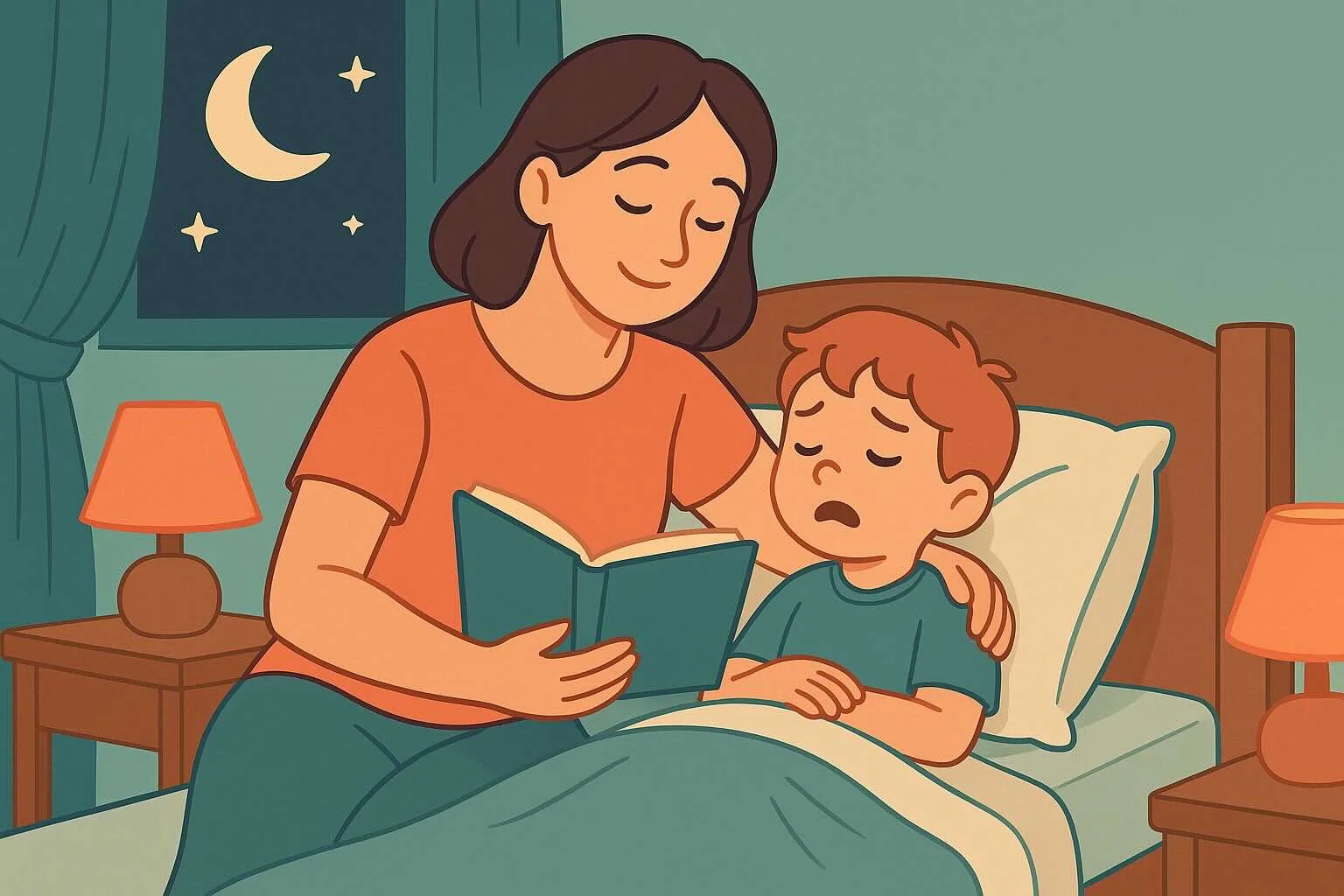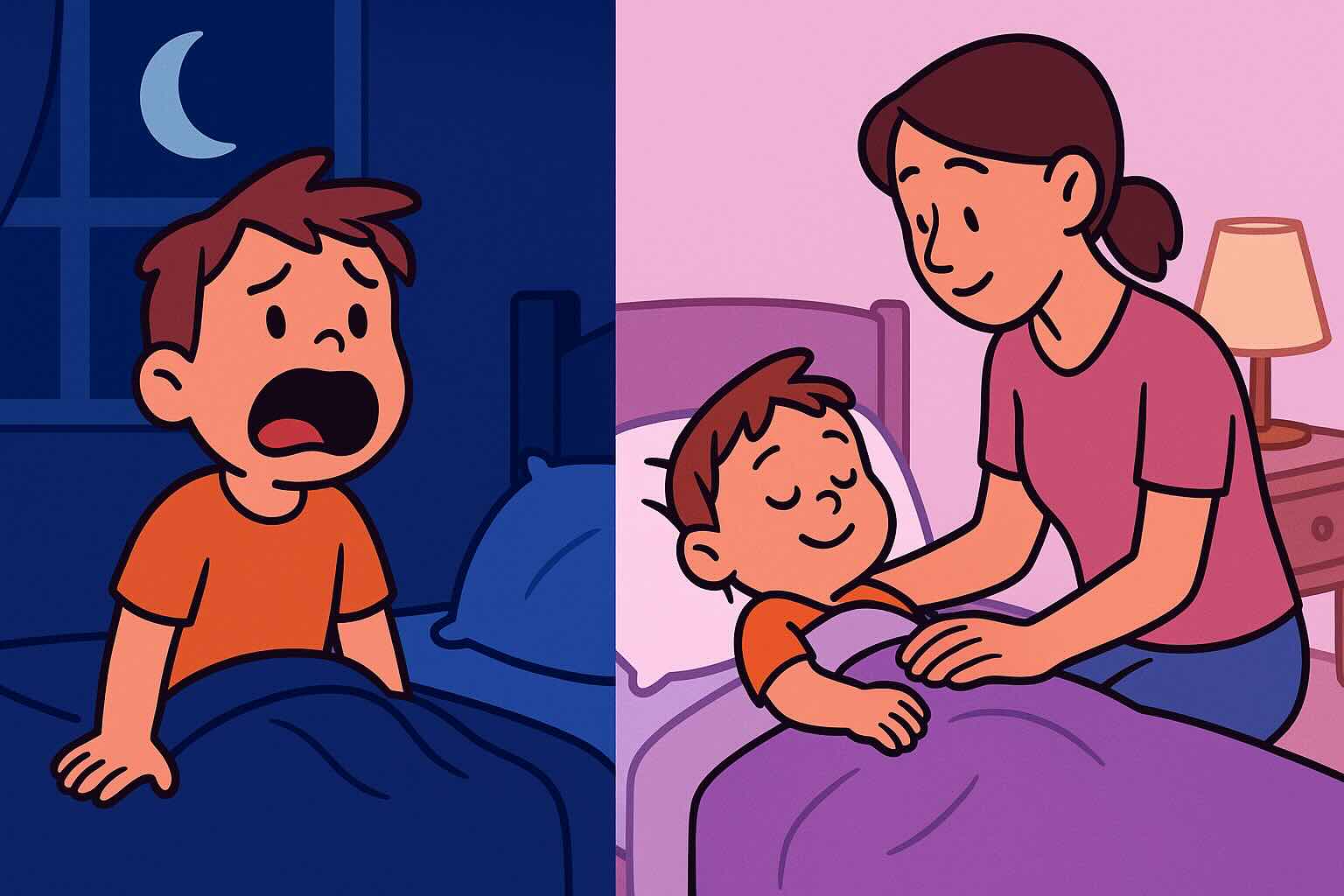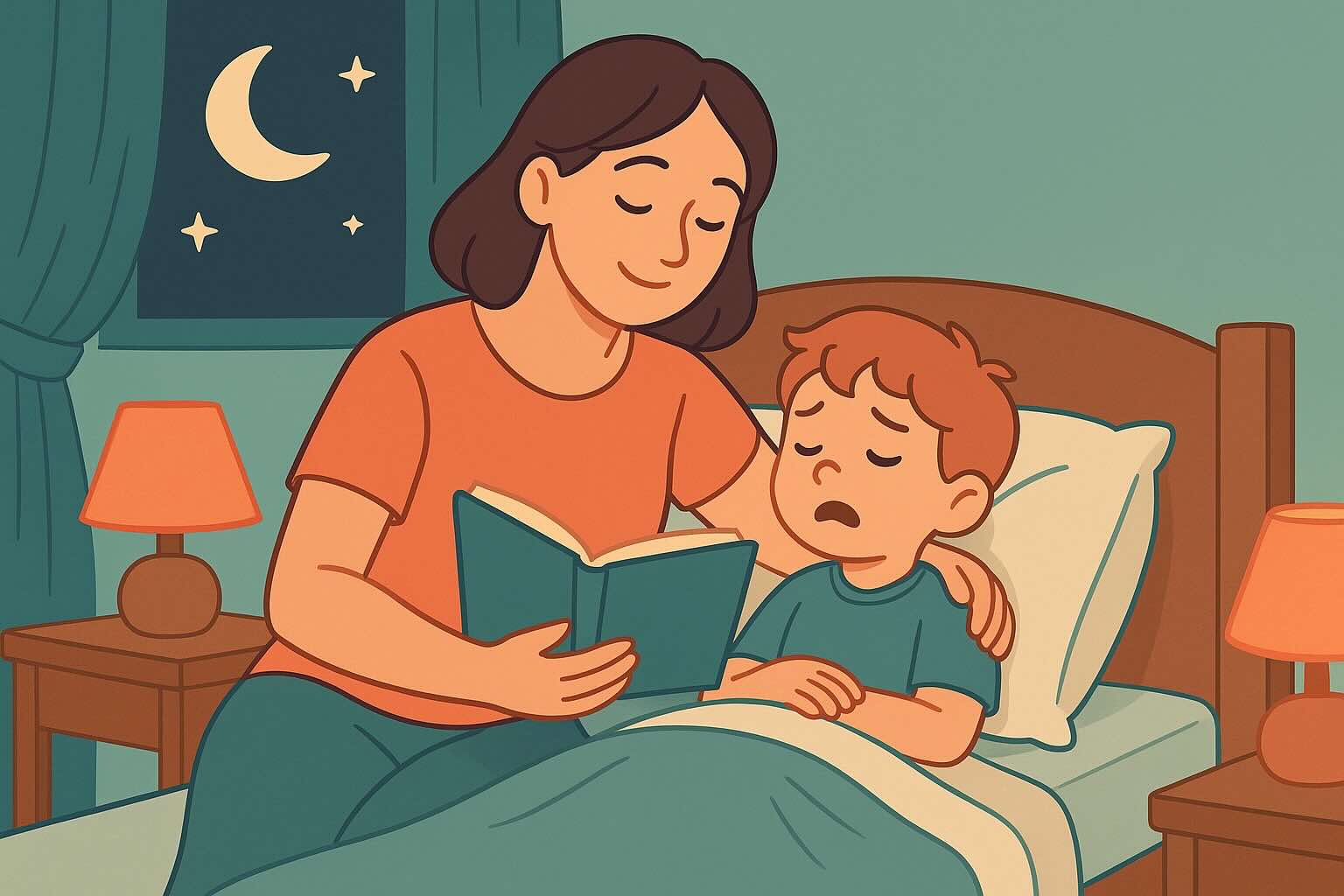5 Year Old Bedtime Routine: 8 Steps for School Success

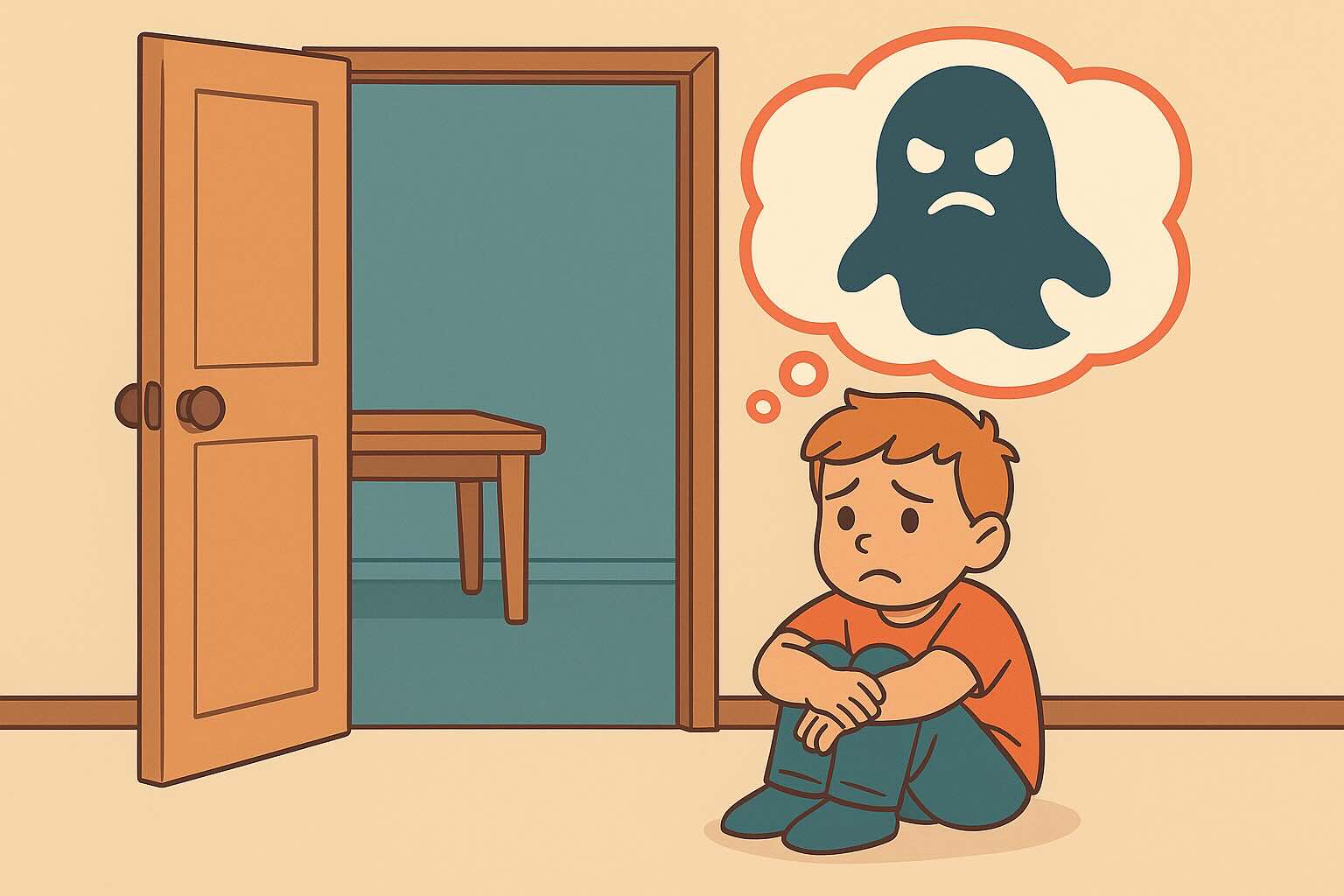
Starting kindergarten represents a major milestone in your child's life—and their sleep needs become more critical than ever. Your 5-year-old's brain is preparing for the intense learning, social challenges, and physical demands of school, making quality sleep absolutely essential for their success and well-being.
If you're feeling pressure to "get bedtime right" before school starts, or if you're struggling with a 5-year-old who seems to have endless energy right when they should be winding down for the night, you're not alone. Research shows that 92% of parents report sleep challenges when transitioning to kindergarten schedules.
The exciting news is that 5-year-olds are developmentally ready for more independent, efficient bedtime routines that can actually make your evenings more peaceful while setting them up for school success.
This comprehensive guide will help you create a bedtime routine that supports your 5-year-old's growing independence, prepares them for academic success, and maintains the connection and security they still need during this big transition.
Understanding Your 5-Year-Old's Sleep and School Readiness
Sleep Requirements for School Success
Five-year-olds need 10-11 hours of quality sleep per night for optimal cognitive function, emotional regulation, and physical growth. For school-age children, this typically means:
- Bedtime: 7:30-8:30 PM (depending on wake time)
- Wake time: 6:30-7:30 AM (school schedule dependent)
- Total nighttime sleep: 10-11 hours
- Naps: Generally no longer needed for most children
The quality of sleep becomes especially important as your child's brain prepares for the demands of formal learning.
How Sleep Affects School Performance
Research consistently shows that well-rested 5-year-olds demonstrate:
Better Attention and Focus: Adequate sleep supports sustained attention during circle time, instructions, and activities.
Improved Memory Consolidation: Sleep helps transfer new learning from short-term to long-term memory.
Enhanced Emotional Regulation: Well-rested children manage classroom frustrations, social conflicts, and separation anxiety more effectively.
Stronger Physical Coordination: Sleep supports fine motor skills needed for writing and gross motor skills for playground activities.
Better Social Skills: Rested children are more patient, empathetic, and cooperative with peers and teachers.
Developmental Changes at Age 5
Understanding your 5-year-old's development helps you create appropriate bedtime expectations:
Increased Independence: They can handle most self-care tasks but may still need supervision for completeness.
Rule-Following Abilities: Five-year-olds understand and can follow multi-step routines consistently.
Time Awareness: They're beginning to understand time concepts and can follow schedules with visual support.
Social Consciousness: They're aware of what "big kids" do and want to act grown-up.
Academic Readiness: Their brains are primed for learning letters, numbers, and following classroom routines.
The 3-Step Sleep Method for 5-Year-Olds
Our proven method works exceptionally well with 5-year-olds because they can understand explanations, follow routines independently, and take pride in their growing capabilities.
Step 1: Create Your Story
Your bedtime "story" for a 5-year-old should reflect their capabilities while maintaining structure. Include:
The School-Ready Bedtime Sequence:
- Transition warning and activity wrap-up (15 minutes before)
- Independent hygiene routine (face washing, teeth brushing)
- Choosing and putting on pajamas independently
- Preparing for tomorrow (laying out clothes, packing backpack)
- Reading time (combination of independent and together)
- Brief connection and reflection time
- Independent settling in bed
Your Response Plan:
- How you'll handle requests for "just five more minutes"
- Your approach to bedtime worries about school or friends
- How you'll respond if they get out of bed
- Your method for handling Sunday night school anxiety
Sample Story for 5-Year-Old: "At 7:45 PM, I'll give a 15-minute warning to finish current activities. At 8:00, we'll go to their bedroom where they'll independently wash their face, brush their teeth, and put on chosen pajamas. We'll spend 2 minutes preparing for tomorrow by laying out school clothes. Then we'll have 15 minutes of reading time—they'll read a book to me, then I'll read a chapter from our special bedtime book. We'll spend 5 minutes sharing our favorite parts of the day and what they're looking forward to tomorrow. I'll tuck them in, give goodnight hugs, and they'll settle independently. If they try to negotiate, I'll say 'You want more time AND your body needs sleep for school success. Sweet dreams!' If they get up, I'll calmly return them with 'Time for sleep.'"
Step 2: Share Your Story
Five-year-olds appreciate detailed explanations and being treated as capable partners in the routine.
How to Share with a 5-Year-Old:
"Now that you're getting ready for kindergarten, we're going to have a special big-kid bedtime routine that helps your brain and body get ready for all the amazing learning you'll do at school!"
Explain each component and its purpose:
- "You'll do your hygiene routine by yourself because you're so capable and independent now"
- "We'll prepare for tomorrow so your mornings are calm and easy"
- "Reading time helps your brain get ready for all the reading you'll do at school"
- "Good sleep helps you pay attention, remember what you learn, and have energy to play with friends"
Connect to School Success: "Students who get good sleep are the best learners! Your teacher will notice how well you can pay attention and how ready you are to learn new things."
Get Their Input:
- "What would help you remember all the steps in our routine?"
- "How can we make sure you get the best sleep for school?"
- "What would you like in your bedtime book basket?"
Step 3: Follow Through
With 5-year-olds, follow-through can be more collaborative while remaining consistent.
Follow-Through Strategies:
For Negotiation Attempts:
- Acknowledge their reasoning: "You have a good point"
- Connect to their goals: "AND getting good sleep helps you be successful at school"
- Stay focused: "Sweet dreams, superstar student!"
For School-Related Worries:
- Validate concerns: "You have some worried feelings about tomorrow"
- Provide reassurance: "You're prepared and your teacher will help you"
- Redirect to sleep: "Rest helps brave feelings grow stronger"
For Independence Challenges:
- Praise efforts: "You're handling your bedtime routine like such a big kid!"
- Offer minimal help: "You can do it! I'll watch to make sure you got everything."
- Build confidence: "You're getting so good at taking care of yourself!"
School-Ready Bedtime Routine for 5-Year-Olds
Here's a detailed routine designed to build independence while supporting school success:
7:45 PM - 15-Minute Warning
"In 15 minutes, we'll start our bedtime routine. Please finish your current activity and put away your toys."
This helps them transition mentally and take responsibility for wrapping up activities.
8:00 PM - Independent Hygiene Time (10 minutes)
Move to the bathroom for their independent routine:
- Face washing: They use washcloth with minimal supervision
- Teeth brushing: They brush independently, you do a "quality check"
- Using bathroom: Final bathroom trip before bed
- Hand washing: Good hygiene practice for school
Praise their independence: "You took such good care of yourself!"
8:10 PM - Pajamas and Tomorrow Prep (5 minutes)
In their bedroom:
- They choose pajamas and dress independently
- Lay out tomorrow's school clothes together
- Pack backpack if needed
- Set out any special items for the next day
This preparation reduces morning stress and builds organizational skills.
8:15 PM - Reading Time (15 minutes)
Balanced literacy support:
- First 7 minutes: They "read" a familiar book to you (builds confidence)
- Next 8 minutes: You read a chapter book or special story to them
- Keep lighting dim but adequate
- Snuggle together in their bed or a cozy reading spot
8:30 PM - Connection and Reflection (5 minutes)
Brief but meaningful conversation:
- "What was your favorite part of today?"
- "What are you looking forward to tomorrow?"
- "What made you proud of yourself today?"
- Share your own favorite moment with them
- Express confidence in them: "You're going to do great things tomorrow!"
8:35 PM - Independent Bedtime
- Tuck them in comfortably
- Final hugs and kisses
- Say your consistent goodnight phrase
- Turn off main lights (nightlight okay)
- Leave with confidence
- Trust their ability to settle independently
Preparing for Kindergarten Sleep Success
Timeline for Adjustment (2-3 weeks before school)
Week 1: Begin shifting wake time by 15 minutes every 2 days Week 2: Adjust bedtime to match new wake schedule Week 3: Practice full school routine including bedtime schedule
Creating School Connection in Bedtime Routine
Visual Schedule: Create a bedtime routine chart that mirrors the structure they'll experience at school
Responsibility Building: Let them check off completed tasks, building the independence they'll need in kindergarten
Time Awareness: Use timers and clocks to help them understand time management
Tomorrow Preparation: Build the habit of preparing for the next day, which supports school organization
Managing School Anxiety at Bedtime
Sunday Night Worries: Create a special Sunday routine that acknowledges school feelings while maintaining normal bedtime
New School Fears: Address concerns during daytime conversations, not at bedtime
Confidence Building: Remind them of their capabilities and school readiness skills
Connection to Teachers: "Your teacher will help you remember what to do, just like we practice at bedtime"
Common 5-Year-Old Bedtime Challenges and Solutions
Challenge 1: "I'm Too Excited About School to Sleep!"
Why It Happens: Anticipation and excitement about school, friends, or activities can make settling difficult.
Solution:
- Acknowledge their excitement: "You have such happy, excited feelings about school!"
- Channel the energy: "Rest helps your body save energy for all that fun tomorrow"
- Use imagery: "Close your eyes and imagine all the fun you'll have tomorrow"
- Create anticipation for sleep: "Sleep helps dreams about school adventures"
Challenge 2: School Worries and Sunday Night Anxiety
Why It Happens: Five-year-olds may worry about academic performance, social situations, or teacher expectations.
Sunday Night Script: "You have some worried feelings about tomorrow. It's normal to feel nervous about new things. You're prepared, you're smart, and your teacher will help you. Right now, your job is to get good sleep so you can think clearly and have energy for learning."
Daily Approach:
- Address school concerns during daytime, not bedtime
- Build confidence through bedtime routine success
- Connect sleep to school success: "Students who sleep well learn best"
Challenge 3: Wanting to Stay Up "Like Big Kids"
Why It Happens: Five-year-olds are very aware of what older children do and may feel bedtime is babyish.
Solution:
- Reframe bedtime as "big kid" behavior: "Smart students know that sleep helps them succeed"
- Point out successful people who prioritize sleep
- Make bedtime routine feel mature and independent
- Praise their big kid behavior during the routine
Challenge 4: Perfectionism and Routine Rigidity
Why It Happens: Some 5-year-olds become very focused on doing things "right" and may get upset if routines vary.
Solution:
- Acknowledge their attention to detail: "You like things to be just right"
- Build flexibility: "Sometimes we need to adapt, and that's okay"
- Praise flexibility when it happens: "You handled that change so well!"
- Maintain core routine elements even when details change
Advanced Independence Building Strategies
Self-Monitoring Skills
Bedtime Routine Checklist: Create a visual checklist they can use independently
- ☐ Brush teeth
- ☐ Wash face
- ☐ Put on pajamas
- ☐ Lay out tomorrow's clothes
- ☐ Get in bed
- ☐ Read quietly
Time Management: Introduce simple time concepts
- "You have 10 minutes for your hygiene routine"
- Use visual timers they can read
- Celebrate efficiency: "You finished with time to spare!"
Problem-Solving Skills
Bedtime Obstacles: Teach them to solve common problems
- "What should you do if you forgot to brush your teeth after getting in bed?"
- "How can you remember to lay out your clothes?"
- Praise problem-solving: "You figured that out all by yourself!"
Emotional Regulation at Bedtime
Big Feelings: Teach strategies for managing emotions
- Deep breathing: "Take three deep breaths to help your body relax"
- Progressive muscle relaxation: "Squeeze and release each part of your body"
- Gratitude practice: "Think of three good things from today"
Sample Scripts for 5-Year-Old Scenarios
When They Want to Negotiate Bedtime
Child: "Can I please stay up until 8:45? That's only 10 more minutes!"
Instead of: Getting into a time negotiation
Try: "You're good at math and time! Your body needs its full sleep time to help your brain work well at school tomorrow. Sweet dreams, smart student!"
When They Have School Worries
Child: "What if I don't know how to do the work at school tomorrow?"
Instead of: Long reassurances about their abilities
Try: "You have worried feelings about school. Your teacher's job is to teach you new things—you don't have to know everything already! Right now, good sleep helps your brain get ready to learn. Tomorrow, you and your teacher will figure it out together."
When They Want to Read "Just One More Chapter"
Child: "Please can we read one more chapter? I really want to know what happens!"
Instead of: Giving in or abruptly ending reading time
Try: "You love this story so much! That excited feeling means we picked a great book. Tomorrow we'll find out what happens next, AND right now your brain needs sleep to remember all the great parts we already read."
When They Claim They Can't Fall Asleep
Child: "I've been lying here forever and I can't fall asleep!"
Instead of: "Just try harder" or getting frustrated
Try: "Sometimes sleep takes a little while to come, and that's normal. Your job is to rest quietly in bed. You can look at books, practice your breathing, or think about happy things. Sleep will come when your body is ready."
Creating the Ideal Sleep Environment for School Success
Room Organization for Independence
Accessible Setup:
- Pajamas in a drawer they can reach
- Bedtime books in a basket by their bed
- Tomorrow's clothes area clearly designated
- Nightlight positioned for safety without sleep disruption
School Connection:
- Display their school supply list or photo of their classroom
- Keep school backpack in a consistent location
- Create a "tomorrow station" for preparation items
Technology and Screen Time Management
Digital Sunset: No screens 1 hour before bedtime to protect natural sleep hormones
Room Technology:
- Remove tablets, phones, or gaming devices from bedroom
- Use analog clocks to teach time awareness
- Consider a CD player or sound machine for consistent audio
Comfort and Security
Transitional Objects: Still appropriate if comforting (stuffed animals, special blankets)
Safety: Ensure room is completely childproofed for independent navigation
Temperature Control: Slightly cooler room (68-70°F) promotes better sleep quality
Supporting Morning Success Through Evening Preparation
The Night-Before Routine
Clothes Selection: Let them choose from weather-appropriate options Backpack Check: Ensure homework, library books, and special items are packed Breakfast Planning: Decide together what they'll eat in the morning Special Items: Set out anything needed for show-and-tell, field trips, etc.
Wake-Up Environment
Natural Light: Open curtains or use a sunrise alarm clock Consistent Timing: Same wake time every day, including weekends Positive Start: "Good morning, superstar! You slept so well and you're ready for a great day!"
Tracking Progress and Adjusting for Success
What to Monitor
Sleep Quality Indicators:
- How quickly they fall asleep (should be within 20 minutes)
- Number of night wakings
- Morning mood and alertness
- Afternoon energy levels
School Performance Connections:
- Teacher feedback about attention and behavior
- Their reports of feeling tired or alert
- Academic performance and engagement
Independence Growth:
- Which routine steps they complete without reminders
- Their confidence in handling bedtime
- Problem-solving when routine hiccups occur
When to Adjust
Earlier Bedtime Needed: If morning wake-ups are difficult or they seem tired during the day
Later Bedtime Possible: If they're consistently lying awake for 30+ minutes after lights out
Routine Length Changes: If routine consistently takes much longer or shorter than expected
Building Lifelong Healthy Sleep Habits
Foundation Skills for Future Success
The habits your 5-year-old develops now will serve them throughout their school years:
Self-Regulation: Learning to wind down and prepare for sleep independently Time Management: Understanding routines and time limits Responsibility: Taking ownership of their bedtime routine Problem-Solving: Handling bedtime challenges independently
Family Sleep Culture
Modeling Good Sleep Habits: Show them that the whole family values sleep Consistent Messaging: "Sleep helps our family be healthy and happy" Celebrating Sleep Success: "You've been sleeping so well and look how great you feel!"
Preparing for Future Transitions
Second Grade and Beyond: The independent skills they're building now will make future schedule changes easier Sleepovers and Travel: A strong foundation helps them sleep well in new environments Academic Demands: Good sleep habits support increasing homework and extracurricular activities
Related Resources for Continued Success
For additional support with your 5-year-old's development and school readiness, explore these related guides:
- 4 Year Old Bedtime Routine Guide - Transitioning from preschooler to school-ready sleep
- Starting School Guide - Comprehensive kindergarten preparation strategies
- Healthy Sleep Habits Guide - Building lifelong sleep foundations
- Managing Power Struggles - Cooperative approaches to bedtime challenges
- Building Cooperation Without Rewards - Intrinsic motivation strategies
- Connection Before Correction Guide - Maintaining relationship during routine building
- Setting Boundaries Without Punishment - Positive discipline for bedtime success
- Childhood Anxiety Complete Guide - Supporting anxious children through transitions
Looking Forward: Your School-Ready Sleep Success
Creating a strong bedtime routine for your 5-year-old is one of the most valuable gifts you can give them as they begin their formal education journey. The independence, responsibility, and healthy sleep habits you're building now will support their academic success, emotional well-being, and physical health for years to come.
Remember that every child adjusts to new routines at their own pace. Some 5-year-olds embrace bedtime independence immediately, while others need several weeks to feel comfortable with new expectations. Both responses are completely normal.
The key is maintaining your calm, confident leadership while celebrating their growing capabilities. Your 5-year-old wants to succeed—both at bedtime and at school—and your consistent support helps them build the skills they need.
As they head off to kindergarten with good sleep habits firmly established, you'll have the satisfaction of knowing you've given them a crucial foundation for learning, friendship, and personal growth. The peaceful bedtime routines you're creating now will become cherished memories of this special transition time in their lives.
Trust in your child's ability to rise to your loving expectations, and celebrate every step toward independence. You're not just creating better bedtimes—you're helping your child become a confident, capable, and well-rested student ready to embrace all the wonderful challenges and opportunities that lie ahead.
24/7 AI Parenting Assistant
Get instant, personalized advice with expert-curated parenting knowledge. Chat with your AI coach anytime, anywhere.
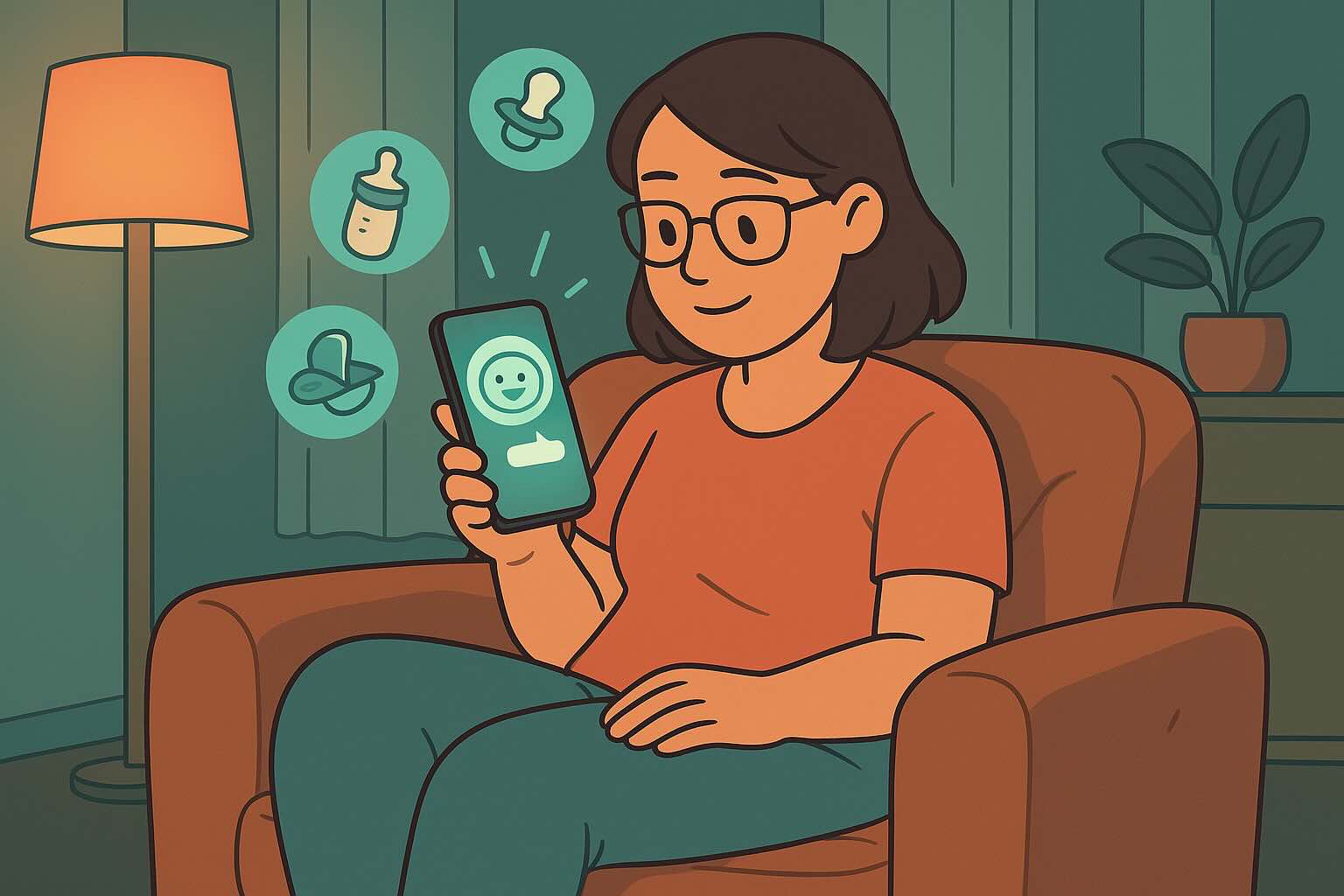
Expert Content Library
Access multimedia resources, articles, and expert-reviewed content organized by topics and your child's age.
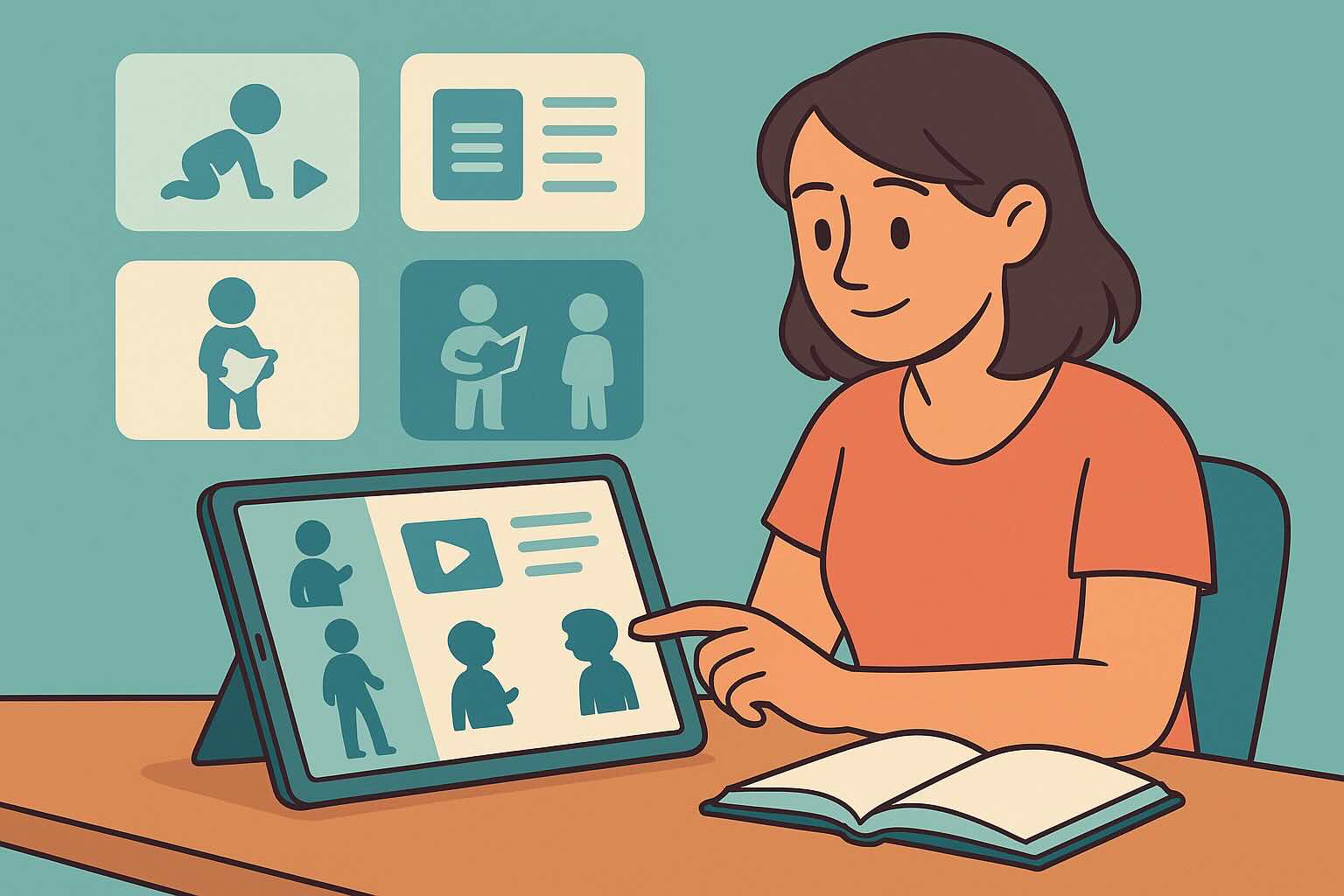
Get Your Free Sleep Training Toolkit
5-day email course + printable sleep log to help your baby sleep through the night
Frequently Asked Questions
Need personalized support?
RootWise's AI coach can provide tailored strategies for your specific situation, available 24/7 when you need it most.
Learn More About AI Coaching →